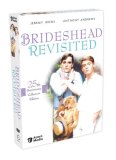| Reviews & Columns |
|
Reviews DVD TV on DVD Blu-ray 4K UHD International DVDs In Theaters Reviews by Studio Video Games Features Collector Series DVDs Easter Egg Database Interviews DVD Talk Radio Feature Articles Columns Anime Talk DVD Savant Horror DVDs The M.O.D. Squad Art House HD Talk Silent DVD
|
DVD Talk Forum |
|
|
| Resources |
|
DVD Price Search Customer Service #'s RCE Info Links |
|
Columns
|
|
|
Brideshead Revisited -- 25th Anniversary Collector's Edition
One of the finest miniseries ever produced, Brideshead Revisited returns to DVD via a re-release of Acorn Media's 2006's Brideshead Revisited: 25th Anniversary Collector's Edition, a four-disc set of the 11-episode series which also includes some interesting extras, such as episode commentaries and a "making of" featurette. There's nothing new added here for those who bought this edition back in 2006 (it's been rolled back out, no doubt, to capitalize on this summer's release of the severely truncated big-screen version of Brideshead Revisited), so double-dipping isn't necessary. But for those who have never experienced the series, this collection is probably the best way to see this rather remarkable film.
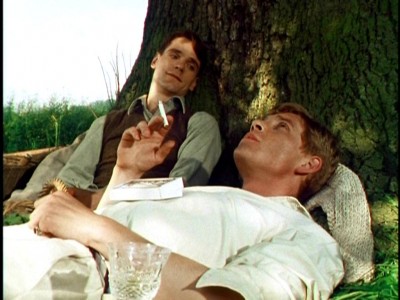
Telling the complex, sad tale of Charles Ryder's (Jeremy Irons) descent from hopeful college youth to empty middle-aged soldier, and his decades-long encounters with the wealthy, charismatic Roman Catholic Marchmain family (a story too long to adequately summarize in just a few paragraphs), the mournful Brideshead Revisited begins, appropriately enough, at the "end" of Charles' life (at least at the end of his youthful passions and dreams as he enters middle-age), as he endures the banality and soul-deadening routine of army life in 1944 Britain. Leading his state-side company to new headquarters, Captain Ryder realizes their destination is Brideshead Castle, the opulent, now deserted estate where his beloved friend Sebastian Marchmain (Anthony Andrews) once lived. Bittersweet memories of intense, platonic love for Sebastian, and the joys of long-lost summer days reveling in the splendors of Brideshead, come flooding back to Charles.
A shy, reserved middle-class student arriving at Oxford for the first time in 1922, Charles is dazzled by the sight of Sebastian, a wealthy, foppish Lord, resplendent in white tweeds and never without his constant companion Aloysius - his stuffed teddy bear. Despite a rather repulsive introduction (a drunken Sebastian vomits in the open window of Charles' first-floor digs), the two young men begin an intense friendship that soon consumes all of their time. A magical trip to Venice, on the dime of Sebastian's father, Lord Marchmain (Laurence Olivier), who lives in Italy with his mistress Cara (Stephane Audran) in order to escape the restrictive Catholic pressures of his wife, Lady Marchmain (Claire Bloom), proves to be a sensory overload that deflates the boys once they return to Oxford in the fall. But more serious trouble than failing grades lurks for Sebastian and Charles, as Sebastian spirals increasingly into drunkenness (a family trait on his father's side, warned about to Charles from Cara during their Venice trip). A deep, unexplained psychological pain tortures Sebastian, and despite his love and friendship, Charles can not reach him.
It doesn't help that Charles' increasing attachment to the Marchmain family exacerbates Sebastian's distress; Sebastian's rigid, controlling mother is particularly loathsome to Sebastian, and seeing Charles taken under her wing (mainly as a spy to relate Sebastian's misadventures to her), breaks Sebastian's heart. The boys drift apart, with Charles moving to Paris to pursue a career in painting, while Sebastian, saddled with the social climber/leech/cage watcher Mr. Samgrass (John Grillo), is forced to travel all over Europe and Northern Africa, escaping many times from Samgrass' oppressive watchfulness. Charles, meanwhile, meets with Rex Mottram (Charles Keating), the vaguely sinister businessman and gambler who is engaged to Julia Marchmain (Diana Quick), the lovely, enchanting sister of Sebastian. A return to England in 1926 has Charles called back to Brideshead, where Julia informs him that Lady Marchmain is dying. She asks Charles to bring Sebastian back from Morocco, where he has been living for some time. Charles travels to Fez, and is shocked to find Sebastian far too ill from alcoholism to travel back home. Charles is equally taken aback by Sebastian's living arrangements with a violent, dependent German soldier. Realizing he can't save Sebastian, Charles returns to England, where his painting career takes off (due to some oils he paints of Bridey Marchmain's (Sebastian's and Julia's eldest brother, played by Simon Jones) London home. Dealing with his own failed marriage, Charles by chance meets Julia on a transatlantic crossing, and the two fall in love. They plan to marry, but will the return of Lord Marchmain to Brideshead set into motion a series of events that threaten the couple's happiness?
SPOILERS ALERT!
I distinctly remember getting caught up in "Brideshead fever" back in January of 1982, when the show broke viewing records on PBS. Before the avalanche of boutique cable networks devoted to this kind of programming, PBS was the only place to find British drama like this, and despite the usually miniscule audiences Public Television was and is known for, mainstream viewers flocked to Brideshead Revisited. It's always difficult to pin down exactly why or how one program "breaks out" with the public, but if you're old enough to remember the early 80s, you know that a desire for conservative nostalgia - as well as an always-present desire to see the rich suffer prettily - was enjoying a resurgence in America. Romanticism was "in," again, during the Reagan era, and the essentially conservative, religious later writings of Waugh (begun with the publication of Brideshead in 1948), synched perfectly with a large portion of the nation that had grown tired of the relentless self-castigation of the late 60s and the 1970s. And of course, rebel colony America (its demographics still overwhelmingly European in heritage in 1982), never having experienced the ingrained, unalterable class structure (nor the royalty) of mother England, continued its long fascination with anything that smacked of wealthy, titled British decadence.
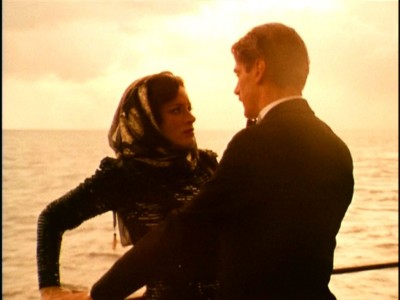
Of course, all of that is waning now. And watching Brideshead Revisited today, 27 years later, is an ironic exercise in self-reflexive identification, at least for me. A novel that Waugh wrote about an already-vanished strata of moneyed aristocracy in 1948, was then turned into a nostalgic miniseries in 1981, which I watched as a dreamy, romantic high schooler, and which I now watch 27 years later, remembering primarily the nostalgia of watching the original airing of the show. A very weird viewing experience, that. Being a tad more versed now in some of the historical, sociological and political contexts that shaped Waugh's story, I can enjoy the subtler, more layered pleasures of this complex tale, but over all, I can't help but respond most strongly to the deeply nostalgic beginning sections of Brideshead Revisited, where Charles and Sebastian find each other, enjoying their happy days together, not knowing how short-lived they will be, through forces beyond their control.
There has been much debate (ever since the novel was first published) over what, exactly, Charles and Sebastian were getting up to together in Brideshead Revisited. Even today, the makers of the new theatrical version of Brideshead Revisited have faced scrutiny and scorn for altering major plot points - and hyping up the homoerotic aspects of the story. Anyone familiar with the British public school system of that time (and the many novels and plays and short stories written about that system) knows that homosexuality among the all-male classes was hardly uncommon. And certainly young Waugh himself at Oxford dabbled in it (before marrying twice). I suppose there was a bit of a charge for more innocent American TV audiences of 1982 when Brideshead Revisited played (not only for the homoerotic angle of the story, but for an R-rated sex scene between Irons and Quick, as well). But the book itself covers this issue discretely, with carefully chosen language that can be interpreted either way as to the true nature of Sebastian's and Charles' relationship.
And the mini is circumspect in this regard, as well. There's no open suggestion the boys are lovers, but that degree of certainly hardly matters, when you consider how tenderly their friendship is depicted here. I can't think of a more delicately shaded portrayal of a deep, platonic, true love between two young friends, than is depicted here in Brideshead Revisited. You can wonder what may be behind those enigmatic, shy glances by Charles towards Sebastian, but again, those kinds of ruminations seem beside the point (or superfluous). The first two episodes showing the boys finding each other amid the loneliness of their home lives, is honest and true and poignantly beautiful, a celebration of love and beauty and youth that's indelibly etched by the filmmakers. The rest of the miniseries simply wouldn't work if we didn't have a real sense that both Charles and Sebastian had irrevocably lost something precious in their youths when they parted - a sense of loss the mini achieves effortlessly.
If Brideshead Revisited was only successful in getting across that romantic aspect of Waugh's reverie, it would have been a major achievement, but the film is quite remarkable in how many of Waugh's other subtexts are also effectively incorporated. The screenplay adaptation by John Mortimer was originally planned to be only six episodes in length, but the success of the early rushes (along with an unexpected production strike that allowed Granada to reevaluate the importance of the mini) convinced the producers to put more of Waugh back into the film (director Charles Sturridge and producer Derek Granger reworked Mortimer's screenplay), with quite striking results. Waugh's central theme of Brideshead Revisited - the redemptive power of the Catholic Church, made all the more attractive by its minority status in Protestant England - courses through the eleven episodes, deceptively hidden throughout most of the film by the scorn and dismissiveness that agnostic Charles puts upon that which he doesn't fully comprehend (particularly the Church's hold on Sebastian and later, Julia). But as the first half of the mini finds fault with the Church, the second half begins to swing the other way, showing the return of Lord Marchmain to the bosom of the Church, the continual struggle (off camera) that Sebastian has with his drinking (made noble by his constant attempts to realign with his faith), and the eventual conversion of Charles to Catholicism. Critics of the novel disparaged what they called Waugh's conservative sentimentalism about religion and specifically the Catholic Church, but admirers (and many readers) pointed out Waugh's wary criticism of dogmatic doctrine, coupled with Waugh's genuine belief in the redemptive powers of faith, embodied most strongly, Waugh felt, by the Catholic Church (of which he was a later convert).
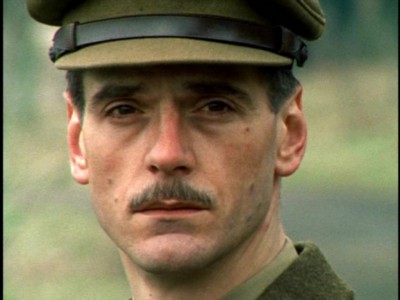
Waugh's fascination with the power of beauty, as well as the attraction for wealth, the attraction for charming, witty, intellectual people, are equally well delineated here in this multi-layered series. As powerful as Charles' fascination for Sebastian is, he's equally drawn to the Baroque splendors of Brideshead Castle - and to the intriguingly unconventional Marchmains - particularly the sad, beautiful, religiously tormented Julia. Some critics of the mini have noted its "stately" pace, but lyricism is absolutely essential here, not only as a key ingredient in getting across the atmosphere of the intense pleasures of youth falling by the wayside as one grows older, but also in allowing enough screen time to cover the many subtexts that Waugh wanted to discuss. Repeat viewings only enhance appreciation for how much of Waugh was incorporated into the mini - and in such a seemingly effortless manner.
Certainly the sumptuousness of the actual filming is a key ingredient to the film's success (as well as a direct visualization of one of Waugh's themes: the appreciation of beautiful, fine things). With the stunning Castle Howard standing in for the fictional Brideshead Castle, Brideshead Revisited has a sweep to it that few minis at that time possessed (at least in England, where this production was considered quite extravagant). And as always with British period dramas, the details are correct, down to antique buttons on the costumes and the correct wall paper for that time period. It's a flawless production design (filmed imperfectly, unfortunately - more about that in the "Video" section below). And as well with these imports from England, the acting is impeccable. Irons and Andrews are an unforgettable pair. I remember quite distinctly the "artistic girls" I knew in high school were simply mad for Anthony Andrews' Sebastian. Watching Brideshead Revisited today, one would think that Andrews' more showy role (he disappears about half-way through the film, but his portrayal haunts the rest of the film) would have garnered him a more showy career, as Irons certainly graduated to in feature films. But Irons (originally cast as Sebastian), has the far more difficult role here, portraying the essentially blank blotter Charles, who grows and matures throughout the mini until his love and loss of Julia, and his eventual stagnation in the war-time army, make you forget Sebastian and his more dramatic, showy tribulations.
Special mention must be made of Nickolas Grace as the aggressively homosexual, aggressively hilarious Anthony Blanche. In many ways the most honest, unsentimental character in the whole story (as well as one of the most likeable - even though he's such a snotty bitch), Grace's Anthony Blanche is the very embodiment of Waugh's character as written in the book, who represents a daring kind of emotional freedom that simultaneously attracts and repulses the staid Charles (and that delights the freewheeling Sebastian). Almost every line Grace delivers is hysterical, but my favorite has to be when, after meeting Charles some years later at Charles' big gallery showing of his latest paintings, Anthony says, in his inimitable swishy manner, "Where are the pictures? Let me explain them to you!" Priceless. Equally humorous is that comedic genius, John Gielgud, who steals every scene he's in as Charles' seriously mad father, Edward Ryder (I can't adequately convey to you the level of hilarity that results when Charles, returning after 15 months to his father's home, greets Gielgud with a, "Hello, Father!" to which Gielgud, torn away from his paper, disapprovingly answers, "Oh, dear."). Laurence Olivier, somewhat shaky in early scenes where he's supposed to be much younger, is delightfully wicked and funny - and quite sad - in his famous deathbed scenes. Diana Quick is appropriately mysterious and sensual as Julia, while Simon Jones does a terrific turn with the deceptively simple Bridey character (he gets as many laughs as Gielgud or Grace).
Of course, no discussion of Brideshead Revisited would be complete without mentioning composer Geoffrey Burgon's score; specifically, his main theme. In one of the commentary tracks on this collection, Jeremy Irons recounts how, when he first heard the theme in the Granada offices, he told the composer that he had done half the work for him, in getting across the beauty, the longing, and the sadness of memory that dogs Charles throughout his life. And he's correct. A theme of delicate exquisiteness, one need only hear those first lilting notes to be immediately transported back to the fictional Brideshead, in a somber world of beauty once attained, of hope possessed fleetingly - all of which is now irretrievably lost.
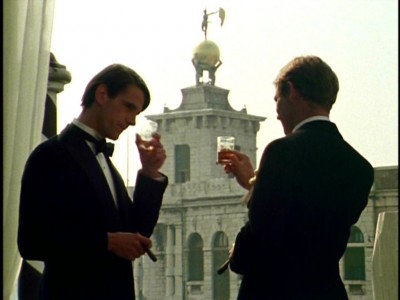
Here are the 11 episodes of the four-disc Brideshead Revisited: 25th Anniversary Collector's Edition set, as described on the DVD slimcases:
DISC ONE:
Episode 1: Et in Arcadia Ego
Early spring 1944. Army Captain Charles Ryder, an artist in civilian life, prepares to transport his dispirited company to brigade headquarters at a secret location. After an exhausting journey through the night, they arrive at the new camp, a formerly grand house called Brideshead Castle. The site of it releases a flood of bittersweet memories for Charles, back to his halcyon days at Oxford in 1922.
Episode 2: Home and Abroad
Charles spends some idyllic time at Brideshead with Sebastian, meeting more of the Marchmains and discovering the role of religion in the family's complicated lives. Besotted with the splendors of Brideshead, Charles accompanies Sebastian to Venice, where the Marchmain patriarch lives in voluntary exile.
DISC TWO:
Episode 3: The Bleak Light of Day
Back at Oxford, Charles and Sebastian both fall into a funk. Lady Marchmain enlists a tutor and Charles to watch over wayward Sebastian, but Sebastian resumes his drunken revelry at the first opportunity. An accident creates a crisis that is narrowly averted, while Sebastian's mood and behavior continue to grow ever darker.
Episode 4: Sebastian Against the World
At Brideshead for Easter 1924, Charles tries to cover up for Sebastian's drinking, but Sebastian turns on him, accusing Charles of being a spy for his mother. Sebastian proves beyond help and is sent down from Oxford. Miserable without Sebastian, Charles also leaves Oxford and chooses to study art abroad.
Episode 5: A Blow Upon a Bruise
Charles sees Sebastian again when they both return to Brideshead for the New Year of 1925. Lady Marchmain has banned alcohol from the house but Sebastian manages to overcome that barrier by persuading Charles to give him money. When Sebastian turns up drunk, Lady Marchmain blames Charles, who leaves, vowing never to return.
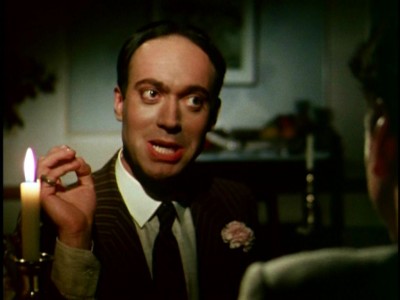
DISC THREE:
Episode 6: Julia
Looking for Sebastian, Rex Mottram visits Charles in Paris and tells him that Lady Marchmain is seriously ill and the family's fortune is dwindling. Rex also announces that he plans to marry Julia. Lady Marchmain reluctantly agrees to the match, provided Rex converts to Catholicism.
Episode 7: The Unseen Hook
Back in England for the General Strike of 1926, Charles learns that Sebastian is living Fez with a German deserter from the Foreign Legion. Because Lady Marchmain is dying, Julia calls on Charles for help bringing Sebastian home. Charles travels to Morocco and finds that Sebastian is too ill to travel.
Episode 8: Brideshead Deserted
Now a successful painter, Charles gets a commission from Bridey to paint the Marchmain family's London house, which is being torn down so the land can be sold to pay off family debts. Two years later, just as Charles' marriage is collapsing, he meets Julia on a transatlantic crossing and the pair discovers they have much in common.
DISC FOUR:
Episode 9: Orphans of the Storm
By the time the ship arrives in London, Charles and Julia have become lovers. At the opening of an exhibition of his work in a London gallery, Charles learns that Celia knows of his affair with Julia.
Episode 10: A Twitch Upon the Thread
Lovers for two years and planning to marry, Charles and Julia are happily reminiscing at Brideshead when an insult from Bridey unleashes all the pent-up guilt and torment of Julia's Catholic conscience. News from Cordelia about Sebastian's fate leaves Charles to contemplate how different their lives had become from the promise of those early golden days.
Brideshead Revisited
Lord Marchmain comes home to Brideshead to die. Bridey's determination to see his father reconcile with the church finally infects Julia, and even Charles, though it seals their fate. Back at Brideshead in the bleak spring of 1944, Charles relives his memories as he walks through the rooms with the HQ commandant. Alone in the chapel, he whispers a prayer.
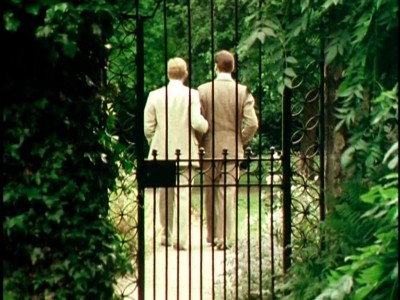
The DVD:
The Video:
Despite all the proclamations of the filmmakers and critics who marvel at the sumptuousness of Brideshead Revisited, much of that must be taken on faith, because, in a disastrous decision that can only be chalked up to the parsimonious budgets of British TV series (then and now), Brideshead Revisited was shot on 16mm film. Until recently, most British TV shows would alternate between video for interior studio sets, and 16mm for location work. But Brideshead Revisited "went all out" and shot everything on 16mm - which was extravagant by their standards, but laughable by American TV guidelines. So regardless of what "restoration" went on for this 25th Anniversary set (and I'll debate that in a minute), you're only going to have, at best, a so-so full-screen, 1:33.1 image, with tons of grain and a soft, soft picture. As for that "restoration," there's a text commentary that states the DVD transfer was taken from the original print that was broadcast 27 years ago (evidently, they didn't even go back to the original negative). So we're down one generation already. As for all the digital cleaning up that's claimed in that text summary (they even claimed they removed, by accident, some birds from scenes shot in Venice), what are big, ugly, black scratches doing in the very first opening scenes? I saw dirt and screen anomalies all throughout the transfer, so I'm not sure what, exactly, was done to "restore" this print. As well, I did notice some compression issues, as well as some tell-tale PAL jiggering from time to time. This is probably the best way we're ever going to see Brideshead Revisited, unless someone tracks down the original neg, and does a clean-up on that - and even then, it's still just 16mm. Too bad.
The Audio:
The Dolby Digital English mono audio track accurately reflects the original broadcast presentation, but, as with the cinematography, the audio recording's fidelity is subject to the whims of the print used here. Loudness levels fluctuate in and out at times, but there is close-captioning if you have difficulty.
The Extras:
Several excellent bonuses are included here in the Brideshead Revisited: 25th Anniversary Collector's Edition. There's a new (2006) featurette, running 47:43, which features many of the cast and crew of the film discussing its complicated production and its reception today. While the actors and people involved behind the scenes are quite entertaining, I can't say the same thing for some of the lesser luminaries who offer up their opinions on Waugh and the series. In particular, "TV critic" Rupert Smith, is needlessly uninteresting, and "broadcaster" Jenni Murray is frequently ridiculous in her assertions. Episode 1 includes a funny, spirited commentary by Jeremy Irons, Diana Quick, and Nickolas Grace (I love it when the moderator asks the very first question, and Irons quickly says, "That's a ridiculous question." Hilarious). Episode 4 features Anthony Andrews and producer Derek Granger in an informative take on the series. There's a collection of vintage outtakes that might amuse you, along with the standard photo gallery, and text production notes and cast filmographies.
Final Thoughts:
Incomparably haunting and sad, Brideshead Revisited is one of the finest TV miniseries ever produced, telling the platonic love story between two young men who find each other at Oxford in the 1920s, and who spiral down from the heights of youthful beauty and hope when they part (only to be ultimately redeemed by their religious faith). Terrific performances and sense of sweep to the lyrically paced mini. Its only drawback? It was shot on amateur-night 16mm film. What a pity. I highly, highly recommend Brideshead Revisited: 25th Anniversary Collector's Edition.
Paul Mavis is an internationally published film and television historian, a member of the Online Film Critics Society, and the author of The Espionage Filmography.


|
| Popular Reviews |
| Sponsored Links |
|
|
| Sponsored Links |
|
|
| Release List | Reviews | Shop | Newsletter | Forum | DVD Giveaways | Blu-Ray | Advertise |
|
Copyright 2024 DVDTalk.com All Rights Reserved. Legal Info, Privacy Policy, Terms of Use,
Manage Preferences,
Your Privacy Choices | |||||||









